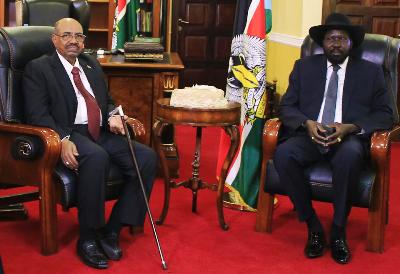Sudan’s Bashir urged president Kiir to sign peace deal : official
August 23, 2015 (JUBA) – The Sudanese president Omer Hassan al-Bashir has urged his South Sudan counterpart, Salva Kiir to sign the internationally-backed regional mediated peace deal aimed at ending the 20-month old conflict in the world’s youngest nation.

“We signed the CPA, but did we complete its implementation up to now,” the Sudanese leader reportedly told president Kiir in the Ethiopian capital, last week.
According to the presidential aide, Bashir said some provisions in the CPA may still be unimplemented, but that this did not mean they would remain the way they are.
“We are not saying they will not be implemented, but you can take the lesson from us,” the South Sudanese presidential aide further quoted Bashir to have explained.
Different sources told Sudan Tribune that Bashir was infuriated by the attitude of the South Sudanese president who refused to sign the agreement despite the insistence of the IGAD leaders.
“Salva (Kiir) does not want to help himself,” he told a Sudanese journalist when he was heading to the airport.
Analysts have interpreted the remarks of the Sudanese leader to mean some contentious matters in the agreement cannot stop its signing, however, difficult they may appear.
The presidential aide said Bashir was indirectly referring to the border issue, issues of the two areas (South Blue Nile and Nuba Mountains) and Abyei, which remains contentious between parties to the CPA during the interim period and after secession.
South Sudanese rebel leader, Riek Machar signed the long-awaited final peace agreement to end the 20-month long civil war in the youngest world’s nation on Monday, but president Kiir declined to sign the same agreement, requesting for more time to consult with his political and military officials back in the capital, Juba.
The agreement signed on Monday, 17 August, which originated from the 24 July Compromise Peace Proposal by the East African regional bloc, the Intergovernmental Authority on Development (IGAD) and its international mediation partners, saw some changes in the course of negotiations in Addis Ababa between the two rival leaders, president Kiir and Machar before the signing ceremony by the two leaders minus Kiir.
On power sharing deal, president Kiir’s government will no longer control 100% of seven of the ten states as the armed opposition faction of the Sudan Peoples’ Liberation Movement (SPLM-IO) under the leadership of Machar will now get 15% of seats in each of the seven states of Warrap, Lakes, Western Bahr el Ghazal, Northern Bahr el Ghazal, Central, Western and Eastern Equatoria states.
Likewise, Machar’s faction will no longer control 53% of the governments of the three states of Jonglei, Upper Nile and Unity states. In the three states, government will get 46%, SPLM-IO 40% and former detainees and political parties, 7% each. While SPLM-IO will nominate governors for the two oil-rich states of Unity and Upper Nile, government will nominate governorship position for Jonglei state.
At the national level, the power sharing ratio remained as the original proposal of 53% for government, 33% for SPLM-IO and 14% split equally between former detainees and political parties.
The current 325 membership of the national parliament in Juba will be maintained with rebelled members reinstated to their previous parliamentary memberships before 15 December 2013. SPLM-IO will appoint 50 additional members to the national parliament while the former detainees will appoint one additional member and political parties will appoint 17 additional parliamentarians.
On security arrangements, the partially signed peace deal will declare the national capital, Juba, a demilitarized zone, with a radius of 25kms. Foreign troops, particularly from the IGAD countries and the United Nations Mission in South Sudan (UNMISS) will take charge of the capital for 30 months of the period of the transition until elections are conducted.
The two rival armies will also maintain separate commands for a period of transition with president Kiir being the commander-in-chief of the South Sudan army (SPLA) and rebel leader Machar also as the commander-in-chief of his forces until unification process is completed per the agreement.
IGAD-Plus officials said the peace deal signed by the two leaders was final and that president Kiir would only be expected to sign it without further renegotiations to the deal.
(ST)
